Table of Contents
Tryptophan is the sole precursor of serotonin. L-Tryptophan’s role in brain serotonin synthesis is critical for mood, behavior and cognition.
Serotonin is often referred to as the “happiness molecule”. Low serotonin levels can result in pain, insomnia, depression, seasonal affective disorder, and chronic fatigue.
For your body to manufacture serotonin, it needs an adequate supply of the natural amino acid Tryptophan. As a nootropic supplement, Tryptophan is used for anxiety, ADHD, depression, insomnia, memory loss, pain, and eating disorders.[i]
A lack of bioavailable Tryptophan in your body can have a big impact on your life.
Tryptophan helps:
- Anxiety & Mood. Tryptophan is an essential amino acid needed to synthesize serotonin which plays a role in mood, sleep, learning and even appetite control.
- ADHD. Low levels of Tryptophan and serotonin imbalances in the brain are associated with ADHD. Studies have found that children with ADHD have 50% lower than average levels of Tryptophan.[ii]
- Neurotransmitters. Low levels of Tryptophan can result in short- and long-term memory loss. Supplementing with Tryptophan has been found to improve memory in healthy adults.
Overview
Tryptophan is an essential amino acid and precursor to serotonin, melatonin and niacin (Vitamin B3) in your body.
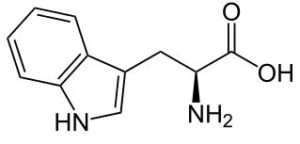
The enzyme Tryptophan hydroxylase converts Tryptophan into 5-HTP (5-hydroxytryptophan).
The decarboxylation of 5-HTP to serotonin is dependent on the presence of Vitamin B6, also called pyridoxal 5’-phosphate (P5P).
The further conversion of serotonin into melatonin requires the presence of SAM-e (S-Adenosyl-L-methionine).
Tryptophan is found in foods like oats, bananas, dried prunes, milk, tuna, cheese, bread, chicken, turkey, peanuts and chocolate.
Eating food containing Tryptophan will increase levels of this amino acid in your body. But not necessarily boost serotonin levels in your brain. Here’s why…
Tryptophan is one of 8 essential amino acids and has the lowest concentration in the body of all the amino acids. Tryptophan requires and competes for active transport to the brain. And competes for the same receptors as the other amino acids.
Research has also found that serotonin levels are enhanced by carbohydrates in your meals because insulin release accelerates the serum removal of some of the amino acids that Tryptophan is competing with.
And if your meal has a higher percentage of proteins, it also slows serotonin elevation in your brain.[iii]
Since Tryptophan from food has issues working its way to your brain to make serotonin, why not skip that step and supplement with 5-HTP instead? Tryptophan and 5-HTP both penetrate the blood-brain barrier. And 5-HTP is the intermediate step in serotonin synthesis.
See my post on 5-HTP for more on why supplementing with 5-HTP instead of Tryptophan is not such a good idea.
How does Tryptophan work in the Brain?
Tryptophan boosts brain health and function in several ways. But two in particular stand out.
- Tryptophan boosts memory. Tryptophan’s main nootropic mechanism of action is as a precursor to the neurotransmitter serotonin. Other neurotransmitters such as melatonin and beta-endorphin increase following Tryptophan supplementation.[iv]
Research shows that Tryptophan and serotonin play a significant role in memory. Enhanced brain serotonin has been shown to improve cognitive performance in animals and humans. And decreasing levels of serotonin through Tryptophan depletion impairs cognition.
A study done in Pakistan assessed memory in rats following Tryptophan administration. The rats received Tryptophan doses of 50 and 100 mg/kg of body weight for 6 weeks. The study showed significant improvement in memory of rats following both doses of Tryptophan.[v]
- Tryptophan enhances mood. As a precursor to serotonin, Tryptophan can have a significant effect on mood. Supplementing with Tryptophan has been found to increase not only serotonin, but growth hormone and prolactin as well.
Researchers infused 11 healthy male subjects with doses of 5, 7.5 and 10 grams of Tryptophan. And then monitored their hormonal and behavioral responses.
Tryptophan produced significant effects on mental and physical sedation but did not increase levels of tranquilization. Tryptophan provided a calming effect without knocking these guys out even at high doses.[vi]
How things go bad
As we get older, our brain chemistry and energy metabolism changes.
↓ Tryptophan levels decline
↓ Tryptophan hydroxylase levels decline
↑ Stress, insulin resistance and age increase
↓ Magnesium and Vitamin B6 levels decline
↓ Neurotransmitter levels decline
↓ Concentration, working memory and executive function decline
↓ Appetite regulation, energy and alertness decline
All of these changes can happen at an age. And are influenced by declining Tryptophan levels. Very little dietary Tryptophan is available for protein and serotonin synthesis. And for many people this can be a problem.
Anxiety, depression, ADHD, memory loss, binge eating and a host of other mental and physical issues have been correlated with low Tryptophan levels.
Tryptophan benefits
Just living in our modern society seems to leave us irritable, stressed-out, and anxious. Worst case is problems sleeping, depression, aggressive behavior, reduced motivation, pain and even suicidal thinking.
 And all have been traced to not enough serotonin in our brain.[vii]
And all have been traced to not enough serotonin in our brain.[vii]
Serotonin, the happiness molecule relies on an adequate supply of Tryptophan for synthesis. Researchers now recognize that the role serotonin plays in psychiatric and behavior disturbances comes from Tryptophan depletion.[viii]
Tryptophan hydroxylase is the rate-limiting enzyme needed for serotonin production. And is involved in the conversion of Tryptophan to 5-HTP (5-Hydroxytryptophan) needed to make serotonin.
This enzyme (Tryptophan hydroxylase) can be inhibited by stress, insulin resistance, magnesium or Vitamin B6 deficiency, or increasing age.
Tryptophan and 5-HTP can penetrate the blood-brain barrier. But Tryptophan requires active transport and competes for the same receptors with other amino acids including tyrosine, phenylalanine, valine, leucine, and isoleucine.[ix]
To complicate things even more, serotonin levels are enhanced by carbohydrates in our diet because insulin release accelerates serum removal of the amino acids competing for Tryptophan transport. And high levels of protein in our diet slows increase in serotonin.[x]
So now you know why it’s helpful to add supplemental L-Tryptophan to your nootropic stack.
How does Tryptophan feel?
Many try L-Tryptophan the first time to cure insomnia or as an alternative to prescription sleep meds.
Dosing L-Tryptophan in the evening will typically ensure you’ll feel great the next day. You should have more energy for working out.
Anxiety levels should decrease. Happiness levels should rise. Tryptophan could help with memory. Music will sound better. Feelings of self-esteem will improve.
Some neurohackers report being able to taper off prescription antidepressant meds by supplementing with L-Tryptophan.
Tryptophan Clinical Research
5-HTP and Tryptophan are natural alternatives for the treatment of depression. And often used as alternatives to prescription antidepressant treatments because they don’t come with the side effects associated with antidepressant drugs.
But as neurohackers we don’t have a lot of research to help us decide if supplementing with Tryptophan makes sense. (If we base our decisions on clinical trials).
Much of the research looks at finding out if low levels of Tryptophan are associated with depression and poor cognition. But there is very little clinical evidence that supplementing with Tryptophan will help reverse low Tryptophan levels. And if adding this nootropic to our stack will boost mood and cognition.
Researchers at the University of Queensland in Australia decided to comb through the research to find out if clinical trials supported the natural health claims of using 5-HTP and/or Tryptophan for depression.
The team located 108 trials of which only 2 studies involving a total of 64 people had sufficient data to qualify. The team concluded that the very limited data showed 5-HTP and Tryptophan better that placebo for alleviating depression. But that larger and more studies were needed before their widespread use could be recommended.[xi]
Low Tryptophan = Depression and Poor Cognition
20 patients in remission or partial remission from depression were studied in a double-blind, crossover design trial. Tryptophan was artificially depleted in these patients so scientists could look at the effects on cognition and mood.
The research team found what we see in real life. Lower levels of Tryptophan had a negative effect on mood, their ability to process positive information, and attention.[xii]
Tryptophan Helps Manage Depression
Serotonin has been recognized as the neurotransmitter that is key to managing depression for the last 30 years. Most of the prescription drug therapies for depression work by raising serotonin levels at the relevant synapses.
We also know that Tryptophan is the immediate precursor to serotonin in the brain. So researchers, using a “what came first, the chicken or the egg” approach decided to find out if low serotonin levels or low Tryptophan levels were to blame for depression symptoms.
Researchers in China analyzed levels of Tyrosine, Tryptophan and serotonin in patients with major depressive disorder. And found that all three were decreased in depressed patients. (Note that Tyrosine is a precursor to dopamine in the brain).[xiii]
The Center for Addiction and Health in Toronto conducted a randomized, double-blind, placebo-controlled trial with 30 depressed individuals. Treatment was fluoxetine (Prozac®) 20 mg per day, 2-4 grams of Tryptophan per day or a placebo for 8 weeks.
Mood was assessed using the Hamilton Depression Rating Scale and the Beck Depression Index during the trial. During the 1st week there was a significant decrease in depression in those who used fluoxetine or Tryptophan.
At 4 weeks the research team recorded a disruption in sleep patterns for those using fluoxetine or a placebo. But not the Tryptophan group.
The team concluded that combining 20 mg of fluoxetine with 2 g of Tryptophan was a safe protocol for treating depression. Patients experienced a rapid decrease in depressive symptoms. And the combination had a protective effect on sleep patterns.[xiv]
DO NOT TRY THIS AT HOME. The trials combining Tryptophan with SSRI’s, SNRI’s and MAOI’s are all done under professional supervision. But remember, Tryptophan is a precursor to serotonin. And antidepressant meds also boost serotonin in the brain. When combined, serotonin levels are boosted even more.
Herein lies the problem. If you increase serotonin too much, you put yourself in real danger of Serotonin Syndrome. Which can lead to all kinds of nasty side effects. Including death.[xv]
DO NOT combine Tryptophan with antidepressant meds unless you are doing so under the careful supervision of a doctor. It is much too dangerous attempting this on your own.
Tryptophan Boosts Exercise Performance
Ever wondered why you cut a workout session short even though physical fatigue wasn’t an issue? Researchers found it could be due to low Tryptophan levels. And its effects on serotonin in your brain.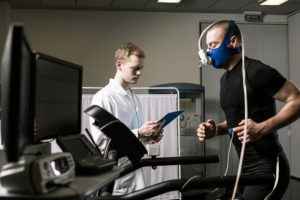
20 healthy young men aged 21 years used a cycle ergometer at about 50% of their physical capacity for 10 minutes followed by maximum intensity exercise for another 30 minutes. This sequence was repeated 3-times, and after the 4th series, each participant continued at the highest speed they could sustain for 20 minutes.
This protocol was performed twice: once with and once without Tryptophan. Researchers found peak power output during the last 20 minutes were higher on trials performed with Tryptophan than those who performed on a placebo.[xvi]
Another trial in Spain recruited 12 healthy sportsmen who ran on a treadmill until exhaustion. Once while supplementing with Tryptophan and once with a placebo.
Total exercise time, perceived exertion rate, maximum heart rate, peak oxygen consumption, pulse recovery rate, and excess post-exercise oxygen consumption were determined during the two trials.
Total exercise time was nearly 50% greater after receiving Tryptophan than after receiving a placebo. Perceived exertion rate was lower when using Tryptophan.
The researchers concluded that the longer exercise time could be due to increased pain tolerance as a result of Tryptophan supplementation.[xvii]
Tryptophan Relieves Symptoms of Seasonal Affective Disorder
Seasonal Affective Disorder (SAD) is a form of depression experienced by many during the winter months. Symptoms include difficulty waking, decreased energy, weight gain, carbohydrate craving, difficulty concentrating, decreased libido, withdrawal, anxiety, depression and irritability.
The first order of treatment is often light therapy. But many do not respond to light therapy typically because of a mutation in the melanopsin gene and the associated signaling pathway between the retina and the pineal gland.[xviii]
The pineal gland in your brain is your source of melatonin which influences sleep cycles. Melatonin is synthesized from serotonin which is synthesized from Tryptophan.[xix]
So if light therapy doesn’t work, possibly supplementing with Tryptophan to stimulate production of serotonin and melatonin could be effective.
Researchers at the University of British Columbia in Vancouver, Canada set out to find if Tryptophan could help those with Seasonal Affective Disorder (SAD) where light therapy failed.
Patients were treated for 2 weeks using light therapy. Those who did not respond to light therapy were treated with 1 g Tryptophan 3-times per day for 2 weeks while continuing light therapy.
The addition of Tryptophan resulted in a significant reduction in depression. 64% of the patients in this study showed very good clinical responses to the combined treatment with minimal side effects.[xx]
Tryptophan Recommended Dosage
Recommended dosage of Tryptophan is 500 – 1,000 mg per day for cognitive benefit.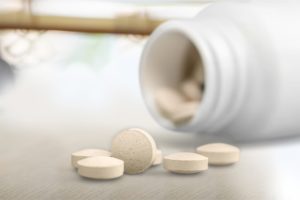
The University of Michigan Health Department recommends much higher doses for:
- Lowering appetite and cravings: .5 – 2 grams per day
- Depression or Anxiety: 2 – 6 grams per day (with medical supervision)
- Chronic pain or migraines: 2 – 4 grams per day in divided doses
- Sleep disorders or insomnia: 1 – 2 grams at bedtime[xxi]
Tryptophan is a precursor to the neurotransmitter serotonin in the brain. Tryptophan hydroxylase is the rate-limiting enzyme needed for serotonin production. And requires magnesium and Vitamin B6 to synthesize serotonin.
Tryptophan is also a precursor to the synthesis of Vitamin B3 (niacin). So if you don’t have enough niacin in your body, supplementing with L-Tryptophan will not efficiently produce serotonin because it’s being used to produce niacin. Which also depletes stores of the vitamin cofactors B1, B2 and B6.
So supplement L-Tryptophan with a B-Vitamin complex that includes Vitamins B3 and B6, and magnesium.
Note that some of the clinical trials used in this post use much higher doses of Tryptophan. Which is not recommended and usually not necessary.
Too much Tryptophan will make you sleepy. And could produce excess levels of 5-HTP and serotonin which can lead to Serotonin Syndrome.
Tryptophan Side Effects
Tryptophan is a normal part of your diet and considered non-toxic and safe at recommended doses.
But in the unlikely event that you already have adequate levels of Tryptophan in your body, supplementing with more could cause problems. As can dosing more that the recommended amount.
Tryptophan could cause stomach upset, loss of appetite, nausea, heartburn, drowsiness, headaches, dry mouth and sexual problems.
Start at the lowest dose to see how your body reacts. When first starting with L-Tryptophan take your dose in the evening to avoid possible drowsiness issues.
Caution: Low to moderate doses of Tryptophan (30 mg per pound of body weight), or about 4.5 grams for the average 165 lb. adult is considered safe and free of side effects. However, most don’t need to dose at nearly these levels.
DO NOT use L-Tryptophan if you are taking antidepressant medications including SSRI’s. Because these drugs delay normal degradation of serotonin in brain synapses leaving more serotonin circulating in your brain.
Too much Tryptophan in combination with these drugs can produce Serotonin Syndrome which can lead to delirium, involuntary muscle contractions, high fever, and coma. And worse case and a very real scenario is death.[xxii]
Type of Tryptophan to buy
L-Tryptophan is available in tablet and capsule form usually 500 – 1,000 mg.
You also get Tryptophan in foods you eat including chocolate, oats, bananas, dried dates, milk, cottage cheese, meat, fish, turkey, and peanuts.
Approximately 300 mg of Tryptophan is available in three ounces of turkey, lamb, beef, tuna, or peanuts. Fortunately, relative to other amino acids, small amounts are needed for a therapeutic effect.
And you get 200 mg L-Tryptophan in Click for Performance Lab® Sleep which also contains 100 mg magnesium (as Magnesium Bisglycinate, Magnesium Taurate, & NutriGenesis® Magnesium) and 500 mg Montmorency Tart Cherry (as CherryPURE®).
But there are all kinds of reasons why your body may not be making good use of the Tryptophan you’re getting from food. See “Tryptophan Benefits” for more on why it may be a good idea for you add Tryptophan to your stack.
Nootropics Expert Recommendation
Tryptophan 500 – 1,000 mg per day
 I recommend using Tryptophan as a nootropic supplement.
I recommend using Tryptophan as a nootropic supplement.
Your body does get some Tryptophan from the food you eat. But this amino acid is competing with other amino acids for transport to your brain. It’s competing for the same receptors. And carbohydrates vs. proteins in your meals can affect Tryptophan’s ability to synthesize serotonin in your brain.
Supplementing with L-Tryptophan will make more of this amino acid available to synthesize serotonin and melatonin.
L-Tryptophan is especially helpful for those with low serotonin levels. Boosting this crucial neurotransmitter can help alleviate insomnia, pain, depression and anxiety.
Start with 500 mg of L-Tryptophan per day and take it in the evening. See how your body reacts and how you feel the next day. Increase the dose to no more than 2 grams per day as needed. And watch for side effects.
L-Tryptophan requires adequate levels of Vitamin B3, B6 and magnesium for serotonin synthesis. So add a good B-Complex vitamin and magnesium to your stack when using L-Tryptophan.
And if you’re dealing with insomnia, consider trying Click for Performance Lab® Sleep

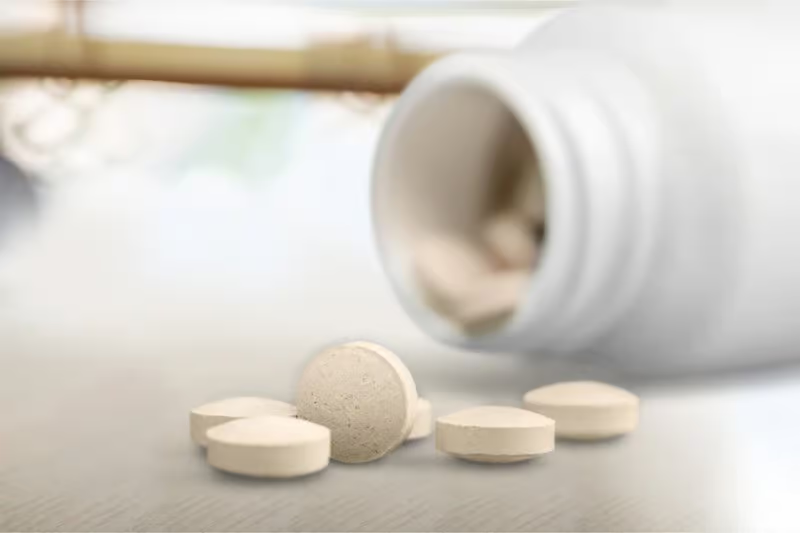
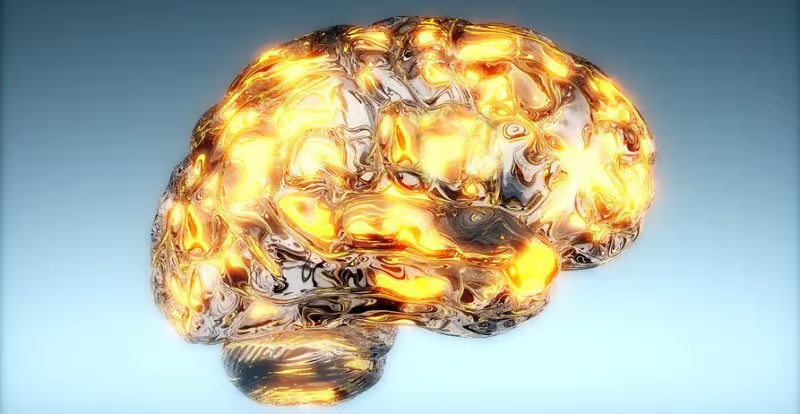






Join The Discussion - 388 comments
Cecil
May 26, 2021
David,
Thank you, read a lot of your research. Can I take L-Tyrosine, L-Tryptophan and berberine together?
David Tomen
May 27, 2021
Cecil, you can but tyrosine is usually taken during the day when you need dopamine. And tryptophan before bed when you need serotonin and melatonin.
Fred
May 20, 2021
Hello David,
I alternate between racetams & herbal extracts. Recently I’ve been feeling really demotivated, with involuntary muscle contractions & tremors. I’m suspecting high serotonin levels accumulation.
What would you do to deal with this? Is there a nootropic to release excess serotonin, or decrease 5-ht… I tried loading on dopaminergics but it hasn’t
helped so far.
Thank you!
David Tomen
May 20, 2021
Fred, the only reliable way to suppress serotonin that I know of is using L-Tyrosine to increase dopamine. Excess dopamine suppresses serotonin and vice versa.
You may also be dealing with acetylcholine overdose or problems with nicotinic acetylcholine receptors.
Fred
May 21, 2021
Thank you for getting back to me David,
Yes, it could also be “acetylcholine overdose or problems with nicotinic acetylcholine receptors” as you pointed out… If this was the case, could something like Noopept reverse it?
Or what would you suggest, other than OTC Anticholinergics/Antihistamines?
David Tomen
May 21, 2021
Fred, any of the racetams put a demand on acetylcholine in your brain. It’s why I recommend each racetam be accompanied by a choline supplement. If you take the racetam without the choline supplements you’ll soon drain your brain of acetylcholine. Not a good idea in the long-term but may be a good short-term solution for you.
I suggest staying away for OTC antihistamines/anticholinergics because they can really mess with your brain.
Nanna
May 12, 2021
Hi David,
Just a bit a bit of backstory. In January I was taking 5htp and tyrosine for mood boosting, following the Mood Cure Protocol. I was feeling great till one morning I took 500mg DLPA with 100mg B6 by accident (by accident higher b6 dose) and resulted in the worst panic attack, hallucinations, paranoia, depersonalisation which continued on and off for the next 2 months. I am feeling much better know, still suffer from high anxiety. Tried 5htp again but it caused me the opposite effect high anxiety euphoria. Anything slightly stimulating like rhodiola, ginseng raises my anxiety, I am still struggling with memory issues, concertation. Also naturally I am serotonin deficient.
Any recommendations ? Thank you.
Would this stack be okay:
CDP Choline 250 mg
aswagandha
Acetyl L carnitine
Lion’s Mane
Turmeric
B Complex, Magnesium, Zinc, C, D, Coq10
Valerian
L Tryptophan and Gaba 500 mg at night
Thank you,
Nanna
David Tomen
May 12, 2021
Nanna, that stack is a good starting point. But try them one at at time first to see how you react to each one.
And make sure the B-Complex, magnesium, and zinc are bioactive forms for these vitamins and minerals. And not synthetic that your body needs to try and convert.
Nanna
May 17, 2021
Thank you David !
Also one last question can you get seretonim syndrome from taking L tryptophan with herbs such as ginseng, gotu kola, Brahmi, rhodiola ?
Thank you, Nanna
David Tomen
May 18, 2021
Nanna, it is highly unlikely that those supplements would result in Serotonin Syndrome. But it really is an individual thing and how your system reacts to those supplements.
Nanna
May 20, 2021
Thank you David
LuAnne
May 9, 2021
Hi Dave, I have been taking Tryptophan for a while. Initially as a sleep aid, but after a while I noticed an antidepressant effect as well. The thing is, it takes 1500mg for both the sleep improvement and the antidepressant effect. When I’ve tried backing off the dosage, both suffer. I started taking Tyrosine twice a day and worried less about the “high” dosage. My concern is that I recently started taking Rhodiola Rosea (500mg). I felt an improvement right away, but began worrying about the Tryptophan again. Tried backing off the dose again, but sleep suffered right away. My question is how worried should I be about Seratonin Syndrome at my current doses?
David Tomen
May 10, 2021
LuAnne, you do not need to worry about Serotonin Syndrome unless you decide to combine your L-Tryptophan usage with a pharmaceutical that also raises or affects serotonin. L-Tryptophan on its own will not cause it. But high dosages of L-Tryptophan while not supporting dopamine will eventually be a problem.
But it sounds like you have that covered. Rhodiola Rosea has been shown to cause Serotonin Syndrome when combined with St. John’s wort AND an SSRI. But that doesn’t sound like your issue.
Jenna
April 3, 2021
Hello! I’ve read into l tryptophan and a lot of your information about supplements. I was considering taking it for my condition. I just want to know if it will safe and good for me to take.
For about 3 months I’ve been struggling with sleeping issues. My body won’t allow me to take naps during during the day anymore, and I seem to get fast heart rate when I try to take a nap, and go back to sleep in the morning from waking up. I wake up a lot during the night but I feel like I dont get into a deep sleep. Im a 23 year old female and about 94 lbs.
My body has a hard time with being relaxed and trying to sleep. I never been drinking diagnosed with insomnia or sleep apnea but I was wondering what it could be from. I also struggle with chronic pain in my body and have tension. Will I be able to supplement with l tryptophan to help with sleep? I feel like I haven’t had a great sleep for 4 months.
Jenna
April 3, 2021
I meant to say, I never been diagnosed with insomnia or any sleeping issues. I also gasp a few times and have breathing issues. It almost feels like my body hates being rested.
David Tomen
April 3, 2021
Jenna, L-Tryptophan may help you. Here are some other ideas for sleep as well: https://nootropicsexpert.com/best-nootropics-for-sleep/.
But have you ever been checked out for what is causing the chronic pain? Is it fibromyalgia?
Jenna
April 3, 2021
I have been checked out by my primary doctor and went to many other doctors but they keep thinking I have anxiety and fibromyalgia. I feel like I may have anxiety but I don’t think I have fibromyalgia. There’s many factors that could have caused the pain.
I was given an antipsychotic medication in the Emergency Room back in August 20th, 2020. It was called Droperidol, and it was taken off the market for 20 years but brought back recently. It caused death in some patients and other issues that’s why it was taken off market. I immediately had an ill response to the medication through IV, and I had many problems since then. Including Laparoscopic surgery in October 2nd. I don’t Know if covid could have caused these chronic pains either.
I really need help because no doctors have helped.. it’s been a hard process and I just really miss my sleep the most, and normal self.. It’s been a cycle of new pains.
David Tomen
April 4, 2021
Jenna, I feel your pain because mainstream doctors couldn’t help me either. And I was on my own looking for answers.
What I learned digging out of that hole was it is possible to get better. But it takes a lot of trial and error. Willingness to experience with different supplements until you find what works.
Use the suggestions from my sleep article to start. There is no one-pill solution. It will take a stack of supplements which you’ll try one at a time. See what works and what you react badly to. Until you find the combo that works for you.
And for now try Kratom to alleviate the pain. More on that here: https://nootropicsexpert.com/kratom/
Jenna
April 4, 2021
Thank you for your comments! My boyfriend told me a lot about what you struggled with and you did your own research and what has helped. It is possible to get better of course! I just don’t want to be stuck with this forever. I also feel like I’m dying every day because I’m not myself anymore.. 🙁
Doctors don’t really know what to help with so I stopped asking for help from them. They just want me on meds but I don’t want to be on meds for help. I considered even changing my diet with no sugar or carbs to see if it helps. What form of L tryptophan is great to use? I am also considering about getting the Performance Sleep Lab. I’ll look more into Kratom as well. Again, thank you very much for commenting!
David Tomen
April 5, 2021
Jenna, the Performance Lab Sleep supplement is great. But for some people it is not enough. And they need to add to it. It all depends on your unique system.
This is a great standalone L-Tryptophan supplement: https://amzn.to/3wxc7JA
Stephen
April 1, 2021
Thank you for this very informative article.
Does glycine compete with tryptophan in crossing the BBB? Will taking theanine at the same time affect the sleep inducing effect? Will taking magnesium bisglycinate affect the sleep onset effect? Is it best to take tryptophan without any other aminos or are some ok?
I’m in the process of getting off hydroxyzine because I kept needing more and more of it and the brain fog the next day was getting scary. I, havign severe rebound insomnia. My first night with tryptophan I started with 500 mg. Three hours later, still wide awake, I took 1g. I was able to sleep incredibly lightly an hour later a little. I took an additional 1g and finally was able to get a few hours of light sleep.
David Tomen
April 1, 2021
Stephen, I use and recommend all the time a combo of L-Tryptophan, L-Theanine, Magnesium Bisglycinate and sometimes glycine and it works fine. They all support each other.
I’d be careful about using such high dosages of Tryptophan because it can upset your serotonin and dopamine balance. Tryptophan goes on to make melatonin as well. Better to use a lower dose of Tryptophan along with the stack above and add Tart Cherry Juice (from concentrate NOT a juice blend). Because Tart Cherry is nature’s best natural source of melatonin.
And here’s a tip for sleeping through the night. Try CBD Oil (https://nootropicsexpert.com/cbd-oil/). I have a link near the bottom of that review for Charlotte’s Web. I use their “Calm” gummies. Two or four gummies depending on what you need.
CTech
March 24, 2021
Hello David,
Thank you for putting these info up as they help a lot!
Taking Effexor XL 150mg & Delmosart XL 72mg (both in am before meal for depression and ADHD) for several years. Between March- October 2020, I tapered Effexor down to 75mg and stayed there till Feb 2021. Delmosart is still at 72mg. I didn’t use supplements up to this point. There were no major physical symptoms however mood was mostly low, avoided social interactions, stress threshold very low with lots of ruminations.
Now, I’ve started to taper Effexor further by 10% every month. Since 15th March 2021, I’ve added (1) 440mg of L-tryptophan & Magnesium before bed, (2) 250mg L-Tyrosine & 200 mg of Theanine twice a day – at noon and 5 pm (3) PCholine complex & NAC at 8am and 4pm (4) 1 capsule each of Two-per-day life extension & DHA during lunch and dinner. My first meal is around noon and last meal around 7pm.
I’m not feeling much improvement in the mood and thinking of increasing both Tyrosine and tryptophan. Is it too early for that?
Regards,
David Tomen
March 24, 2021
GTech, only you can answer that question. I suggest that you become very knowledgeable about the mechanism of action for each of those drugs. Wikipedia is a good source for that. And compare that to the mechanism of action for each of these supplements.
Be aware of which supplement potentates which drug. And be careful about what you raise while testing. If you are cautious in this approach you will stay out of the danger zone. And the worst that will happen is you’ll be uncomfortable for a few hours if you over do it.
CTech
March 25, 2021
Agreed. As per their pharmacodynamics, looks like they inhibit Serotonin, Dopamine and Noradrenalin. I’m tapering slowly, one med at a time and adding supplements concurrently to avoid crash once the meds dosages are low enough to finally stop. Also, I’m taking tryptophan at least 10 hours away from SSRI keeping in mind the half life of antidepressant.
Last time I tried this in 2018, there were no supplements as I tapered both at same time and then stopped at a higher dosage than 10%. Had to get back on higher dose of both meds after resisting the terrible withdrawals
for 8 months. So fingers-crossed for this time.
Thank you David!
Kate
March 18, 2021
Hello David,
Your response to my other question was very helpful and I am hoping you don’t mind me asking another question. I have been taking L-tryptophan 1000mg with a Methyl B Complex and Chelated Magnesium 300mg before bed to try to stop my multiple night wake ups. I have had insomnia for around four years now. Is there anything else I can try combining L-tryptophan with? Could the dosage be too low? I have tried it with GABA 2000mg and separately GABA with L-theanine, but there was no noticeable effect on my sleep quality.
Thank you in advance!
David Tomen
March 21, 2021
Kate, I suggest taking your B-Complex earlier in the day. Because your body and brain need those vitamins during the day. There will be enough left over if you need them during the night.
Reduce your L-Tryptophan dose to 500 mg. And try adding 500 mg Lemon Balm, 200 mg L-Theanine and if you still need something try 20 mg CBD Oil.
Kate
April 30, 2021
Hi David,
Thank you. I have been taking the combination you suggested for a few weeks now. I still wake up 2-3 times a night, so I have stopped taking SAM-e in the mornings and increased the L-Tryptophan dose to 2g. I have also increased CBD oil gummies dose to 80mg, having read research that suggests higher doses help with sleep. I tend to sleep deeper after around 3-4am (bedtime around 10pm).
I have read some research on L-tryptophan that suggests that ‘ significant changes in serotonin synthesis occurred at 5 hours following amino acid consumption’. Should I be maybe taking all my sleep supplements much earlier than at bedtime? I am guessing my body takes longer to make serotonin and then melatonin.
David Tomen
April 30, 2021
Kate, each of us metabolizes these supplements differently for a variety of reasons. I find that L-Tryptophan works for me within about 90 minutes. You may take a little longer. But not 4 hours. That doesn’t make any sense.
But be careful with such a high dose of L-Tryptophan because long-term you are going to suppress dopamine. And then you have another problem to deal with.
Kate
May 1, 2021
Thanks, I will lower the L-tryptophan dose. Is CBD safe at higher doses? I have read that some studies found 160mg to be effective for insomnia.
Glycine lowered my blood pressure too much so I stopped taking it.
David Tomen
May 2, 2021
Kate, CBD is safe at higher doses. It depends on what you can tolerate. You would need to take a huge amount of CBD to get into trouble. Just use common sense and listen for how you feel at higher doses of CBD.